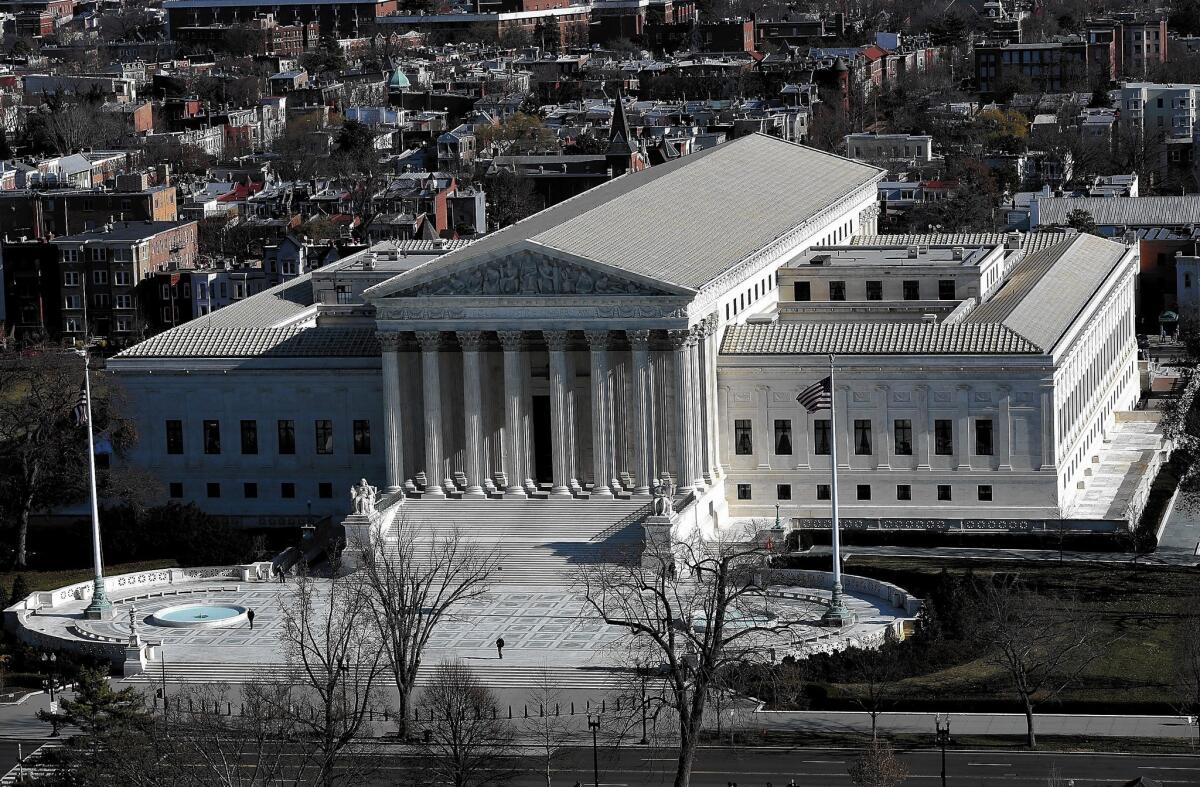Supreme Court to hear 1st Amendment challenge to labor unions

- Share via
The Supreme Court will hear a 1st Amendment case this week involving Chicago-area in-home care providers that could end up dealing a major blow to public-sector labor unions.
Illinois, California, Maryland, Connecticut and other states have long used Medicaid funds to pay salaries for in-home care workers to assist disabled adults who otherwise might have to be put in state institutions. The jobs were poorly paid and turnover was high.
Over the last decade, more than 20,000 of these workers in Illinois voted to organize and won wage increases by joining the Service Employees International Union.
But the National Right to Work Foundation, an anti-union advocacy group, sued Gov. Pat Quinn and the SEIU, accusing the state and union of conspiring to relabel private care providers as state employees so they could collect more union fees.
“This scheme is nothing more than pure political payback,” said Patrick Semmens, a director of the group, complaining that unions have helped fund Quinn’s campaign.
They are also challenging whether workers who don’t want to participate in the union should be forced to pay dues, a longtime union practice known as “fair share” fees. The lawsuit was filed on behalf of several mothers who take care of their disabled adult children at home and resent the idea of paying about $50 a month in union dues.
A federal judge in Chicago and the U.S. 7th Circuit Court of Appeals rejected the suit, citing Supreme Court precedents dating to 1977 that allow unions representing teachers and other public employees to collect fees from all workers, including those who object to the union.
But the Supreme Court may be ready to reconsider those precedents, and some predict that justices will use the Chicago case to do so.
Two years ago, Justice Samuel A. Alito Jr. wrote an opinion that rebuked the SEIU in a California case and said the union had wrongly collected special dues from all employees to pay for political ads. The SEIU said it intended to give refunds later to nonmembers of the union.
But Alito’s opinion went beyond the dispute over political funds and cast doubt on whether unions should continue to be able to force public employees to pay union fees even if they don’t want to. The 1st Amendment generally protects Americans from being forced by the government to join groups or pay for causes they oppose, he said.
“Compulsory fees constitute a form of compelled speech and association that imposes a significant impingement on 1st Amendment rights,” he wrote, joined by four fellow conservatives. “Our cases have tolerated” these forced fees for public employees in the past, and “we do not revisit [them] today.”
Conservative advocates saw Alito’s opinion as an invitation to mount a broader challenge to public-sector unions on 1st Amendment grounds. In California, Washington attorney Michael Carvin, who led the lawsuit against President Obama’s healthcare plan, filed a suit in Orange County against the California Teachers Assn.
He sued on behalf of 10 teachers who objected to paying $350 to $400 a year in fees to support the union. A federal judge rejected the claim in December, but the challengers plan to appeal to the U.S. 9th Circuit Court of Appeals and then the Supreme Court.
The Illinois case also grew in importance following Alito’s opinion. At first, the right-to-work lawyers had argued that Gov. Rod R. Blagojevich and his successor Quinn were wrong when they treated the in-home care workers as state employees. While they are paid through state funds, they are hired by private citizens and work in private homes, the challengers said.
Once the case of Harris vs. Quinn reached the Supreme Court, the anti-union attorneys raised the stakes and urged the justices to overturn their 1977 ruling in Abood vs. Detroit Board of Education, which upheld forced fees for all public employees who are represented by a union.
Lawyers said about a dozen states had authorized in-home care providers to join unions and bargain as state employees. They include California, Connecticut, Maryland, Massachusetts, Oregon and Washington. Republicans governors in Ohio, Pennsylvania and Wisconsin repealed those orders, they said.
Susie Watts, a Chicago-area mother who cares for a disabled 27-year-old daughter at home, is glad to have the support but sees no need for a union.
“Nothing could be more meaningful for me than caring for her at home,” she said. “But I didn’t have any choice about this union. I don’t need it, and there is no opting out.”
However, Keith Kelleher, president of the SEIU Healthcare Illinois and Indiana, said the union had helped improve the lives of employees as well as those who are cared for at home. “This saves the government billions of dollars over institutions,” he said. “We don’t want to go back to the old days.”
The union contract with the state raised wages for in-home care providers from $7 an hour to $11.65 an hour this year. They also won benefits, including health insurance.
Disability rights advocates hailed the change. “We needed a stable workforce, with good wages and benefits,” said Amber Smock, director of advocacy for Access Living in Chicago. “And we did it with the SEIU.”
Harvard University law professor Benjamin Sachs, a labor law expert, said it would be “pretty radical” for the high court to strike down “fair share” fees that public-sector unions have come to rely upon.
“With all due respect, this is a public decision,” he said. “You can agree or disagree, but the decision to have collective bargaining was made by the majority.”
Just as lawyers are required to pay state bar fees, it is reasonable, he said, for employees who benefit from collective bargaining to pay a fee.
More to Read
Sign up for Essential California
The most important California stories and recommendations in your inbox every morning.
You may occasionally receive promotional content from the Los Angeles Times.














